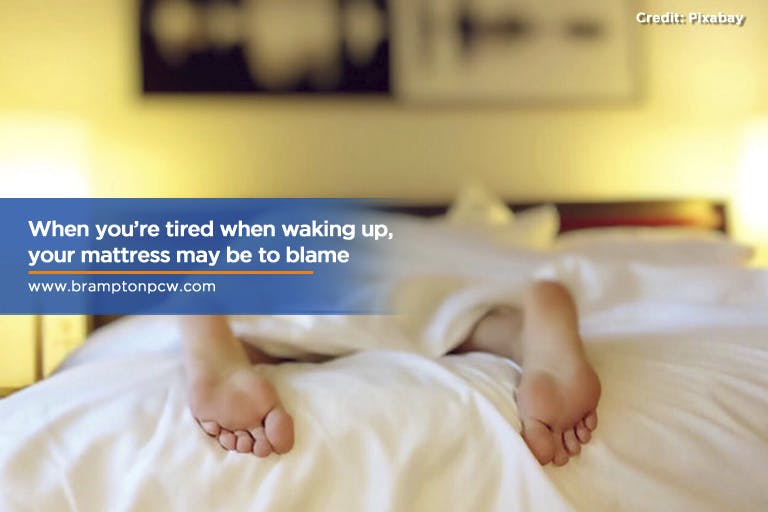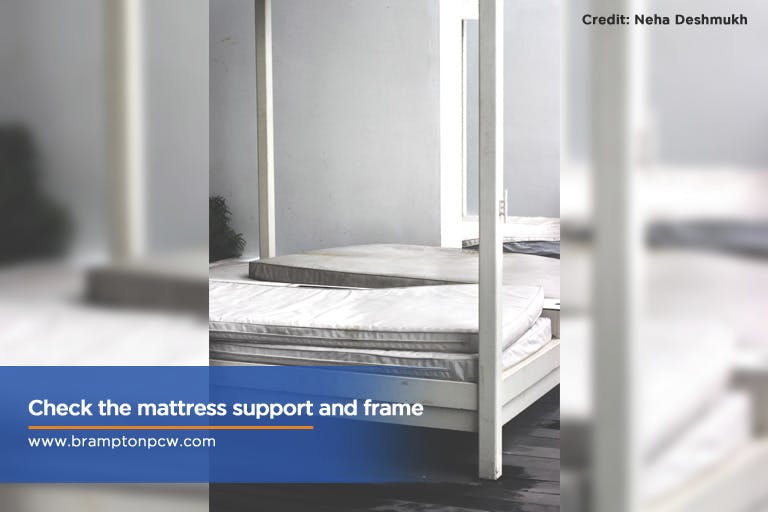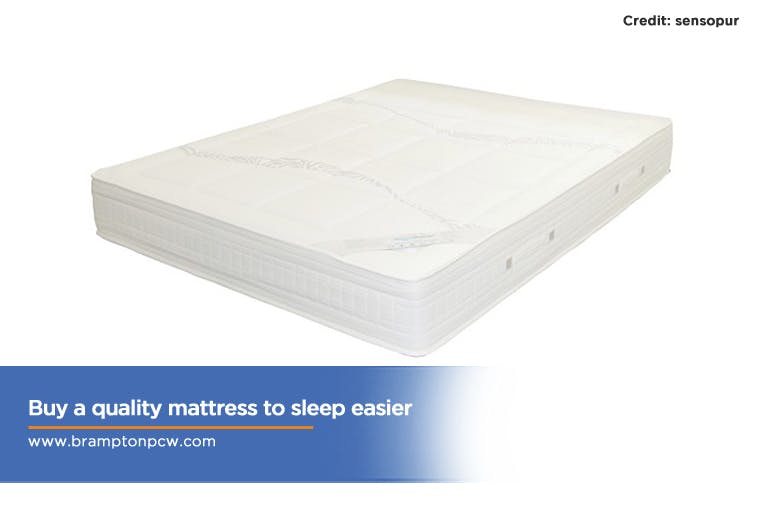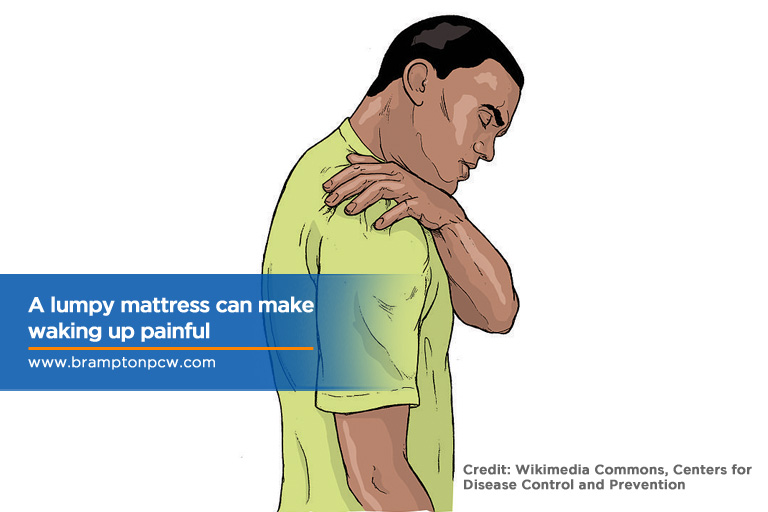Is It Time to Replace My Mattress? 11 Signs It Is
Conventional wisdom has it that a mattress should be replaced roughly every ten years. The exact time can depend on the material, but most mattresses last about that long. As you near the end of that time, you may wonder when exactly you should replace it. There are common clues that can tell you when your mattress is nearing the end of its lifecycle.
Watch for these warning signs that your mattress is on its last legs (or springs).
- Painful mornings
Do you wake up stiff and sore regularly? Your mattress may be the culprit if you have more aches and pains in the morning than when you went to sleep. A good indicator is if you feel better after stretching. Mattresses degrade over time and lose their ability to support your neck and back. When shopping for a new bed, a firm mattress may not be the best answer for you. Try sleep-testing different ones to find one that gives the support you need.

- Waking fatigue
Do you find yourself waking up tired and feeling drowsy throughout the day? After a good night’s sleep, you’re supposed to feel rested and ready for the next day. Your mattress may be causing you to move around in your sleep, making it harder for you to get enough rest. When the mattress is to blame, your body works overtime to find a comfortable position your bed can’t provide.
- Lumpy surface
Do the words “lumpy” and “saggy” describe your mattress? Lumps and sagging in the mattress create an uneven surface for your back. When you lie down to sleep, your back doesn’t get the proper support it needs to get optimal rest. While we often associate them with lower-quality mattresses, lumping and sagging can occur in high-quality mattresses that have run their course.

- Lasting impressions
Do you leave an impression in your mattress? Over time, your body educates your bed on your sleeping patterns, creating an imprint of your resting shape on its surface. If you find any visible impressions, check how deep they are. Indentations as deep as 3 or 4 centimetres can contribute to restless sleep. If your mattress has degraded this far, make getting a new one a top priority. In the meantime, try out massage therapy to work out those kinks.
- Regular sneezing
Do you sneeze when you wake up? You might be in for a new mattress if your allergies act up first thing in the morning. Beds attract allergens (e.g. mould and dust mites). Regular vacuuming and flipping your mattress over helps but is eventually no longer effective at controlling allergens. If you’re in the market for a new bed, consider one made from hypoallergenic materials (e.g. wool or latex). Use a dust mite resistant mattress cover and make a habit of washing your pillows and bedding to extend the life of your new mattress.

- Sofa envy
Do you find yourself sleeping on the couch when you need a good night’s sleep? If you find that you’re sleeping better in a different bed, it might be time to get a new mattress. This is especially true if you’re sleeping more comfortably away from home (e.g. on a hotel mattress). Pay attention to where it feels easiest to sleep to know if you need a new mattress.
- Old age
Do you remember when you bought your mattress? Mattresses age, just like people do. And as they get older, damage from wear and tear can accumulate, and your bed will fail to support your back correctly. The back’s natural S-curve should be evident when lying down. Get a new mattress when your back feels flattened or exaggerated.
When you buy a new mattress, write the date of purchase on it to help you recall when you bought them. That can help you know when to replace your bed in the future.
- Spills don’t dry
A mattress can go through a fair amount of liquid in its lifetime, including sweat, spilled drinks, and bed-wetting. Usually, you would then take your mattress out to dry in the sun. However, older mattresses retain moisture more than new ones. If your bed is taking longer to dry than it used to, it probably needs replacing.
- Weight changes
Have you experienced sudden changes in weight? Sleep disorders can cause weight gain, which can affect a mattress’ quality. What was comfortable a few years ago may not be sufficiently supportive if you’ve gained or lost a few pounds. The same problem can occur when you have a partner in bed. The weight of another person can reduce the amount of sleeping surface and support.

- Creaking and squeaking
Does your mattress make suspicious noises? If so, something important might be broken. You may have a problem with the foundation or frame -- especially if you have a new mattress that doesn’t feel right. Inspect your bed’s box spring and frame to ensure they are still intact. Broken springs can accelerate your mattress’ breakdown; and without enough centre support, even a new mattress can sag and create an uneven surface.
Your mattress should provide adequate support for your back and help you get a good night’s sleep. These factors are vital to preventing muscle pain and letting you feel recharged for the next day.

When you are shopping for a new bed, there are things you can do to make your search more successful, like knowing what to look for in a mattress. After you buy one, there are tricks to getting the most out of it. Your bed can last several years with the right care. Use these tips to help prolong its life and get plenty of support when you sleep.
- Use a mattress protector to protect against dust and spills
- Include a box spring or foundation to give the mattress enough support
- Rotate the mattress every 3 to 6 months to ensure even wear
- Open the windows regularly to reduce dust and moisture buildup
- Keep pets off the bed to eliminate damage from clawing and chewing
- Refrain from jumping on the bed to avoid damage
- Remove the sheets and covers occasionally to air the mattress
The quality of your mattress is an integral part of resting and recharging when you sleep. When it is old and worn, it becomes less effective at helping you get that rest. Watch for these signs to know when you need a new mattress. With the right one, you can avoid chronic back pain and get enough rest for the next day.
When you need help with muscle pain, give Brampton Physiocare & Wellness Clinic a visit. We offer a wide variety of services to get you the treatment you need to get better. Our team works closely with you to give you a personalized treatment plan that addresses your health and mobility concerns. Call us at (905) 497-1311 and get on the road to recovery.







